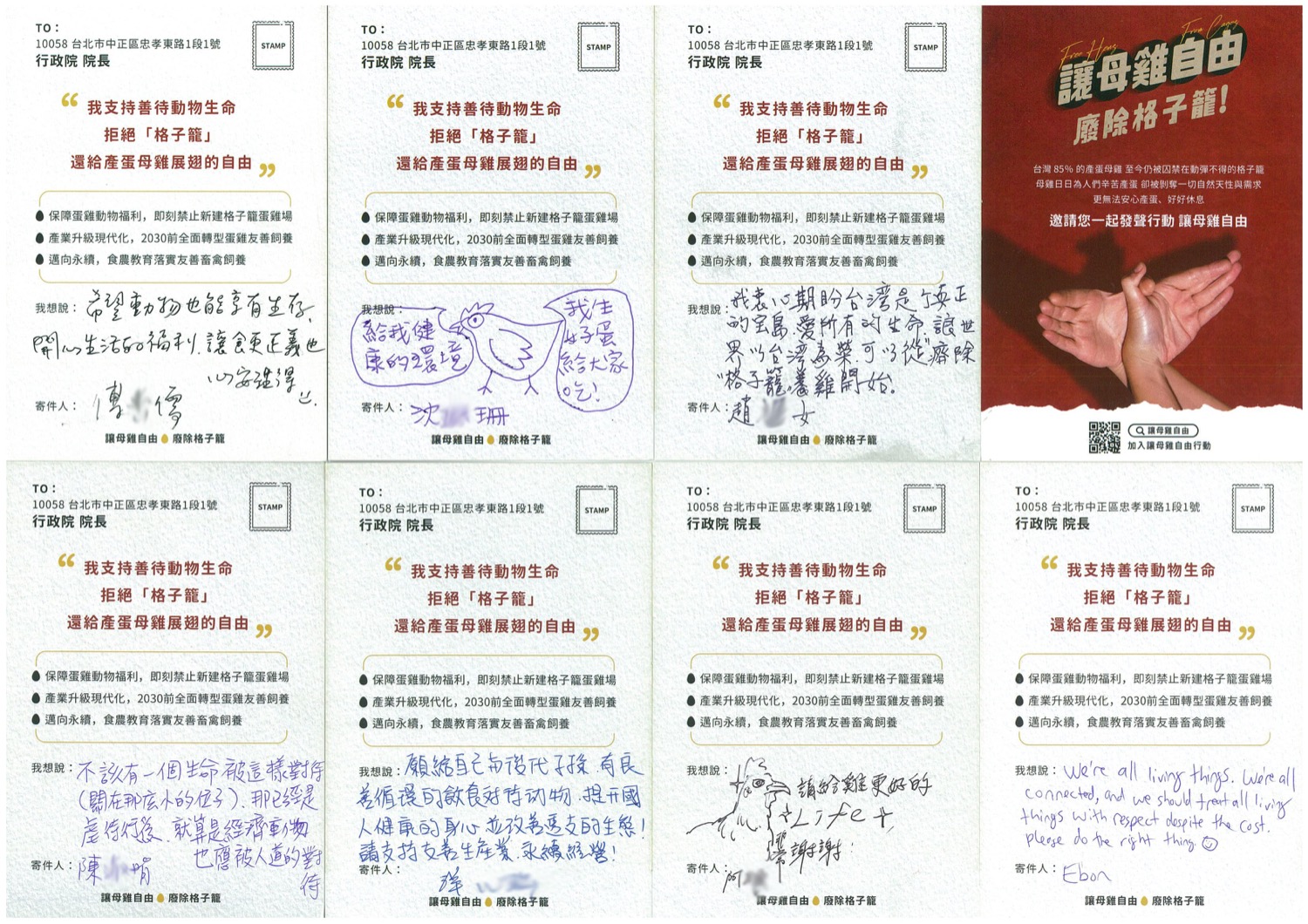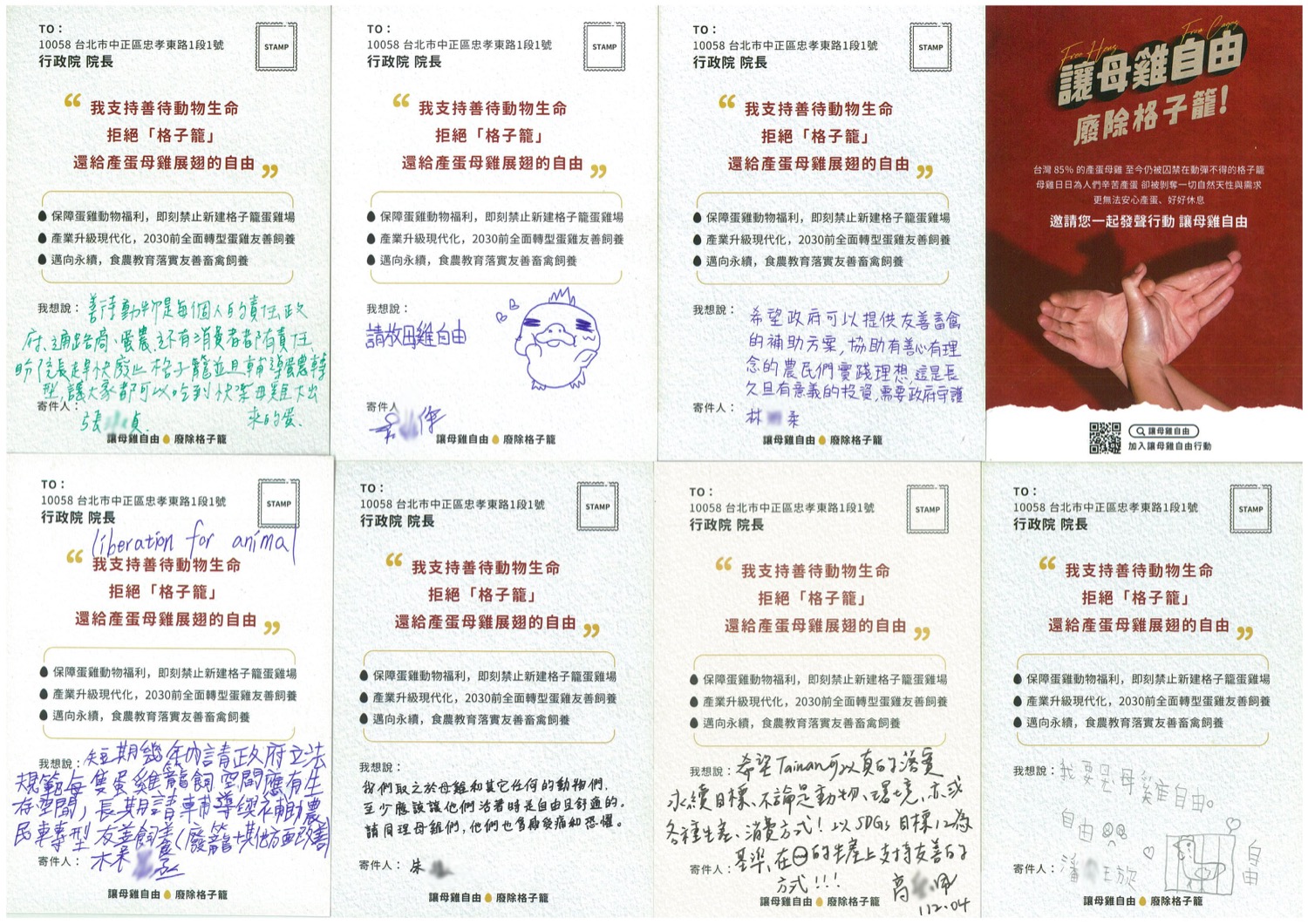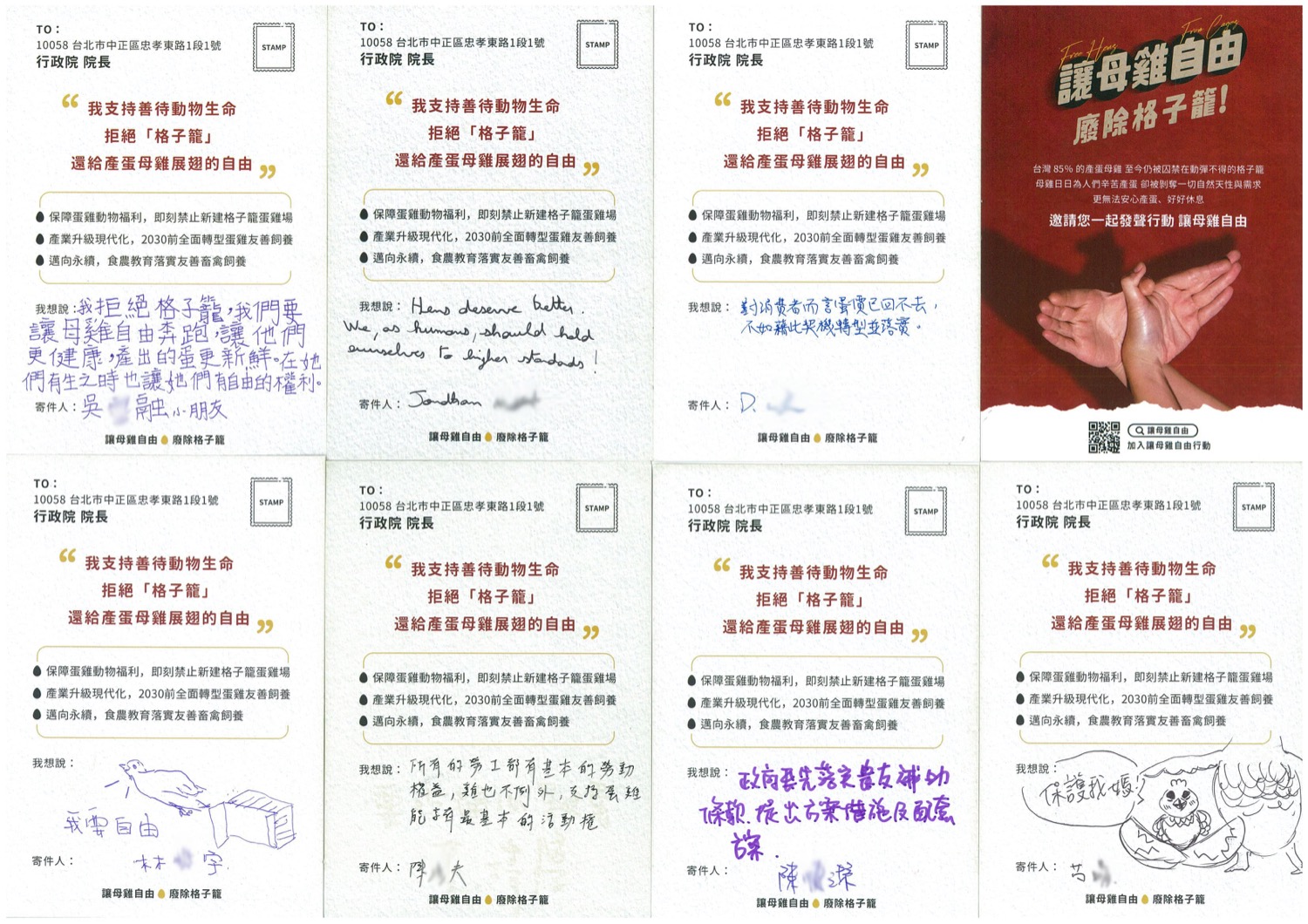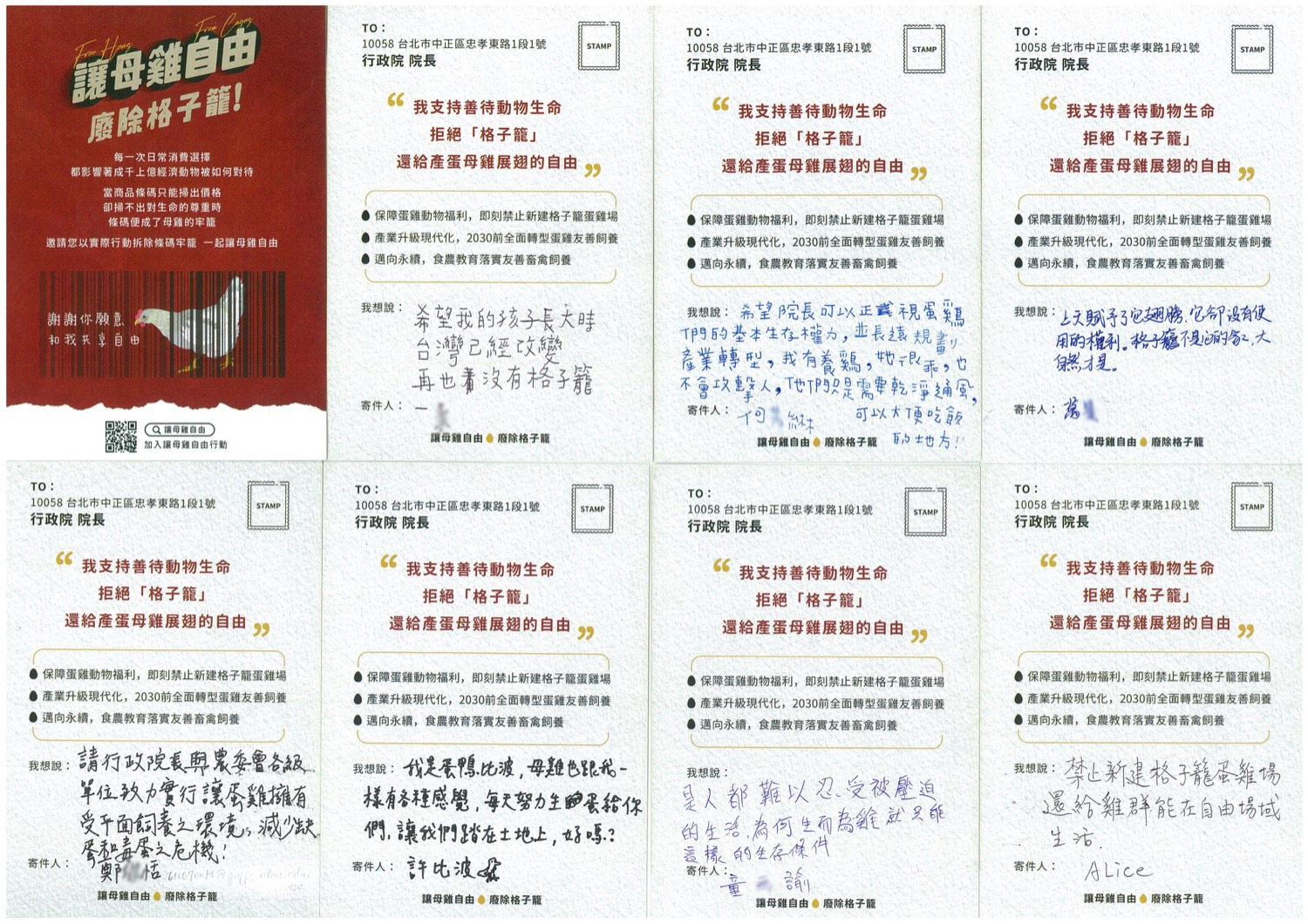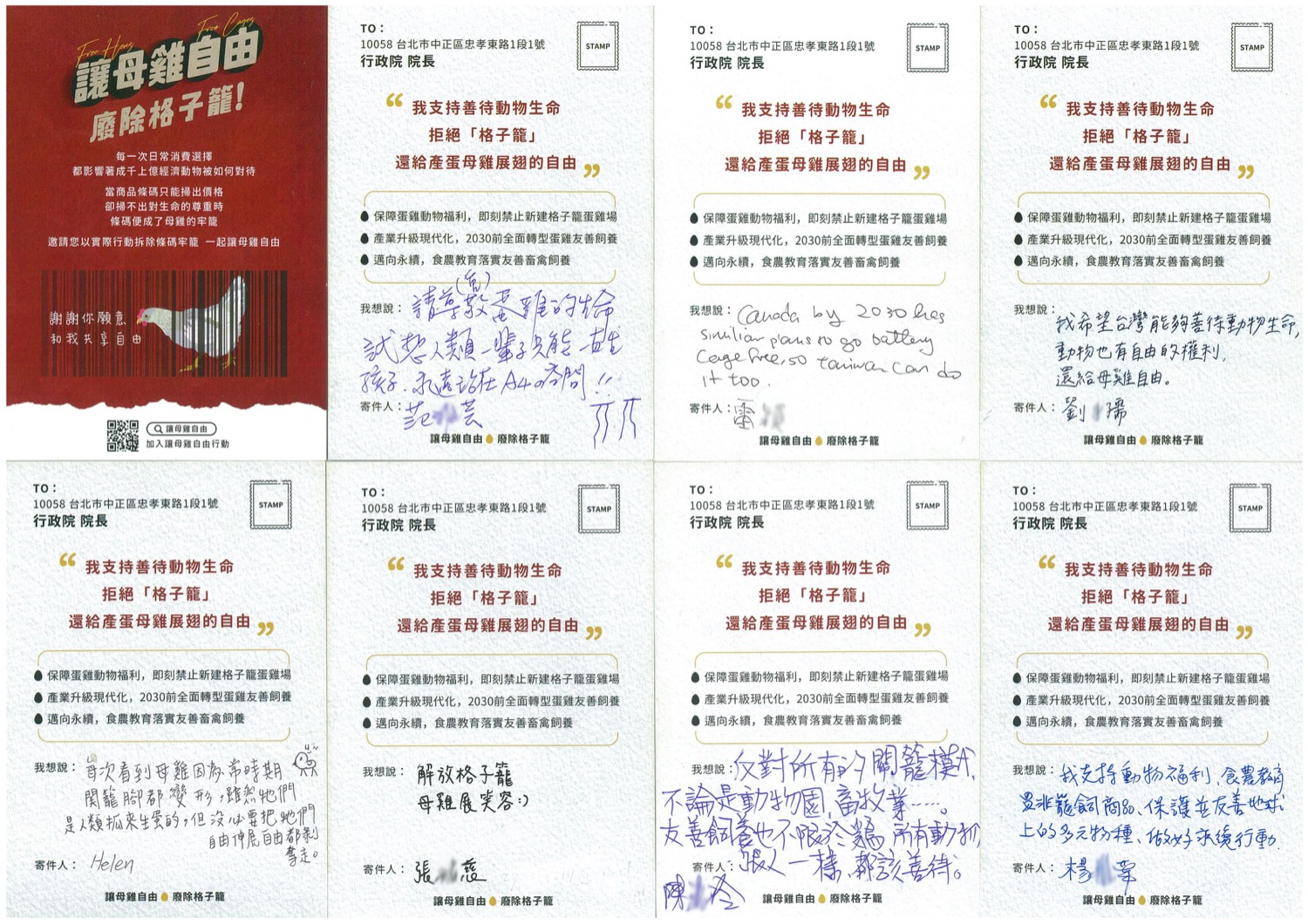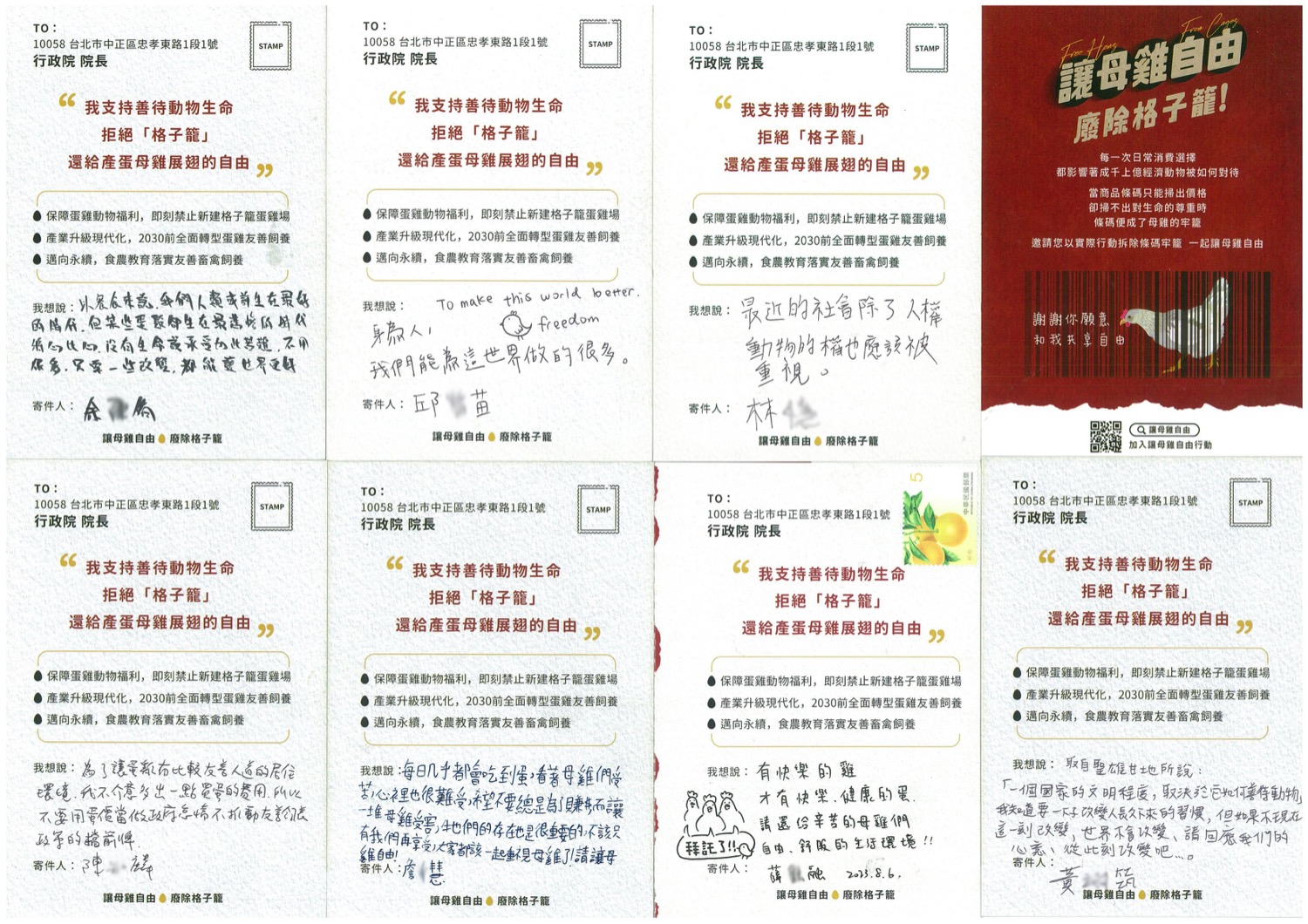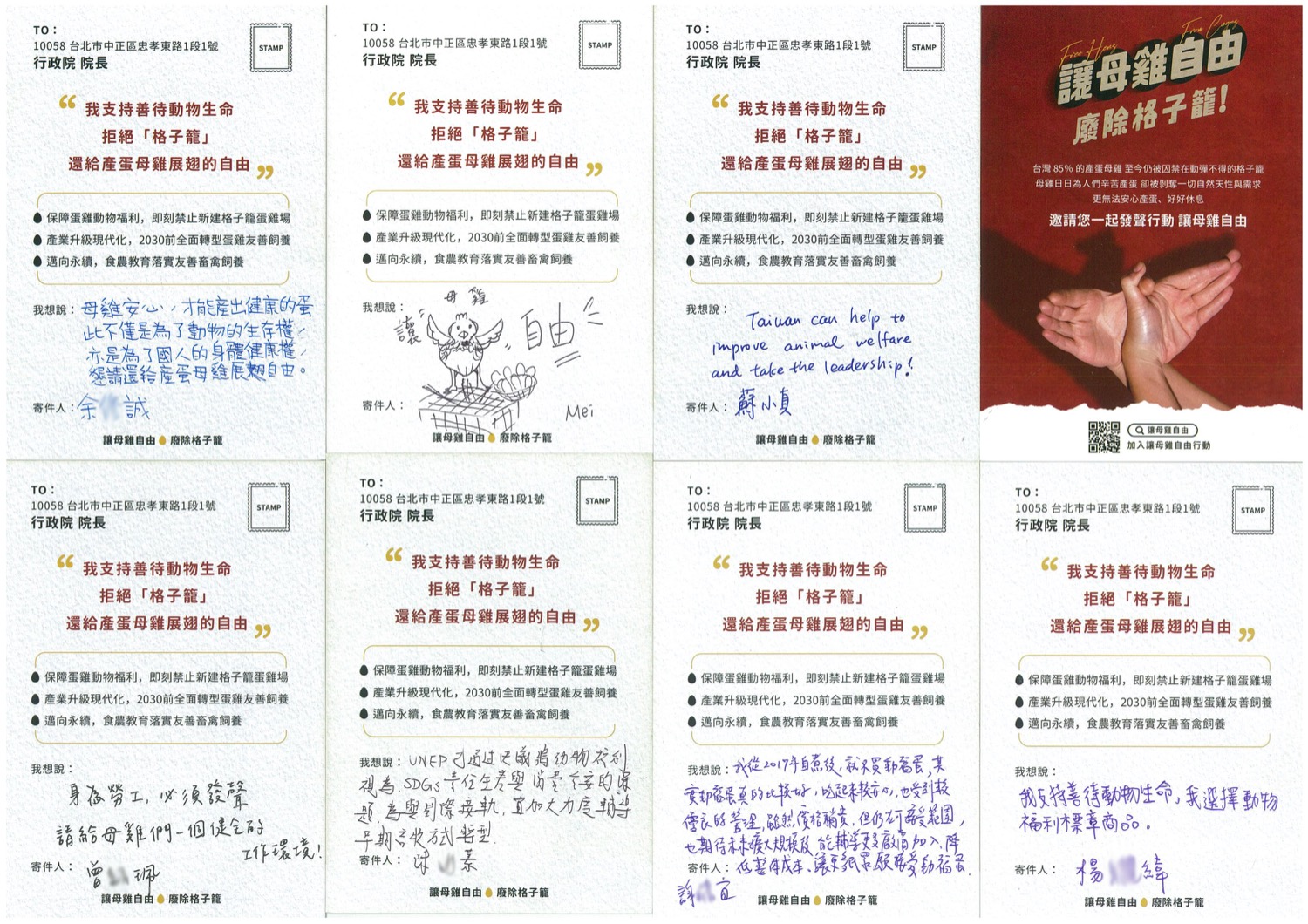On October 26, the Environment & Animal Society of Taiwan (EAST) erected a mammoth mural outside the Executive Yuan to demand a ban on battery cages in Taiwan. The mural is comprised of some of the more than 10,000 postcards signed in support of the campaign and spells out the message Let Hens Be Free.
-min.JPG)
EAST demanded the government:
- Halt construction of new battery cages
- Phase out existing battery cages by 2030
- Promote animal welfare in food and agricultural education
See full appeals at end of article
-min.JPG)
Wu Hung, chief executive of EAST, stated “In Taiwan, more than 85% of laying hens are stuffed into cramped battery cages where they spend their entire lives with less space than the size of an A4 sheet of paper. These sensitive animals are deprived of the ability to engage in their natural behaviors, which can result in stress, frustration and even physical deformity.”
Already, more than 300 high-profile figures, individuals and brands have endorsed the campaign to phase out battery cages including legislators, chefs, veterinarians and farmers. The campaign garnered tacit support from President Tsai Ing-Wen, who expressed her distaste for battery cages and called on authorities to accelerate the transition.
A diverse coalition of supporters including political figures, academics, and cage-free farmers backed public calls for a transition away from battery cages.
-min.JPG)
Legislator Chen Jiau-Hua of the New Power Party said recent egg shortages proved the government must enact policies to initiate the transition away from battery cages. While this cannot be achieved overnight, outlining a clear plan for the transition will reduce any impact on farmers and increase the chance of success. Whoever is elected as president in upcoming elections must respond to public opinion and move quickly to being the transition, said Chen.
-min.JPG)
Green Party Taiwan highlighted Taiwan’s first survey of attitudes towards farmed animal welfare which found nearly 60% of adults supported a ban on battery cages, while more than 80% were concerned about the links between animal welfare and food safety or zoonotic diseases. The party affirmed its commitment to speaking up for the environment and vulnerable life forms and support for the transformation of Taiwan’s egg industry.
Professor Chih-Feng Chen of National Chung Hsing University pointed out that farmers seeking to move away from battery cages frequently run into legal obstacles and are often unaware of government supports. Chen called on the government to set a clear policy direction and establish support measures to minimize friction in the transition process. As seen overseas, the first steps are to end construction of new battery cages, set a phase out timeline, and develop a transition plan. Presently, 59% of egg farmers have not heard of the government’s animal-friendly production guidelines, while 40% have not heard of low-interest loans for farmers investing in animal-friendly facilities according to a survey commissioned by authorities in 2021.
-min.JPG)
Professor Chuang-Hsien Wu of National University of Tainan pointed to research into animal welfare in the European Union which identified market-based, farmer- based and government- based approaches. Wu emphasized that government-based approaches – including capacity building, legislation and lastly enforcement – cannot be overlooked and that it is time for Taiwan to move towards the legislative phase.
Candy Chou, manager of Bei Yi Farm, stated that Taiwan has been trapped in a vicious cycle of raising ‘too many hens, producing too few eggs.’ Chou argued battery cages contributed to Taiwan’s flagging lay rate – which lags behind international counterparts – and that the status quo cannot guarantee a safe, stable egg supply.
-min.JPG)
Deng Yan-Jing, manager of Ping Lin Farm, observed that animal-friendly farms in Taiwan with good husbandry management have managed to achieve lay rates of 80-90%, and are also well positioned to attract young talent with superior working conditions to battery cage farms.
Huang Jun-Cheng, director of the Taiwan Green Dining Guide, observed that animal welfare is an important component of a sustainable diet and green business opportunities. Huang noted that numerous countries have taken steps towards animal-friendly farming including the United States, South Korea, Australia, New Zealand, Israel and Bhutan. Article 1 of Taiwan’s Organic Agriculture Promotion Act stresses the importance of animal welfare and now is time for stronger action, said Huang.
Lin Jia-Min, founder of Wild Chicks Farm, an educational farm in Taipei City, urged the government to strengthen agricultural education to promote healthy and sustainable diets, noting that the newly-passed Food and Agricultural Education Act specifically addresses animal welfare.
Alan Ho, general manager of Holiday Inn Express Chiayi, stated that this year’s egg shortage convinced him of the need for brands to source animal-friendly eggs. Ho’s team decided to source eggs from a modern cage-free farm which combines animal welfare, economic efficiency, and advanced food safety controls.
-min.JPG)
Mabel Chou, former president of the National University of Taiwan Animal Rights Club, expressed that farmed animals devote their lives to providing sustenance for humans and treating them with respect is both our fundamental ethical responsibility and an integral part of a sustainable future.
Wu Hung invited members of the public to continue to stand up for hens at a rally on December 2. The rally will call on presidential candidates to include a phase out of battery cages in their election platforms.
Media contact
Fang Chu Chune, Researcher
Environment & Animal Society of Taiwan (EAST)
Mobile: +886 (9) 2317 7193
Phone: +886 (2) 2236 9735
Let Hens Be Free – Campaign Appeals
- Halt construction of new battery cages
- Require all farms provide sufficient space, nest boxes, perches and litter to satisfy hens’ natural behaviors, respecting that hens are sentient beings
- Acknowledge that hens raised in battery cages are subject to immense physical and psychological suffering and that the shift away from battery cages is a global trend and cannot be avoided
- Amend Taiwan’s animal husbandry regulations to require farmers comply with the Definitions and Guidelines for Friendly-Egg Production set out by the Ministry of Agriculture
- Phase out existing battery cages by 2030
- Establish a pathway to phase out battery cages by 2030, including production milestones
- Formulate measures to facilitate the transition away from battery cages, assist farmers in the transition, and provide subsidies for equipment
- Cultivate animal-friendly husbandry talent, strengthen professional knowledge and capabilities, and revitalize the sector
- Promote animal welfare in food and agricultural education
- Bring together producers, consumers, government and academia to promote the transition
- Encourage the business sector to incorporate animal welfare into ESG initiatives and source animal-friendly agricultural products
- Source animal-friendly eggs for military, public service and education meals and school lunches







